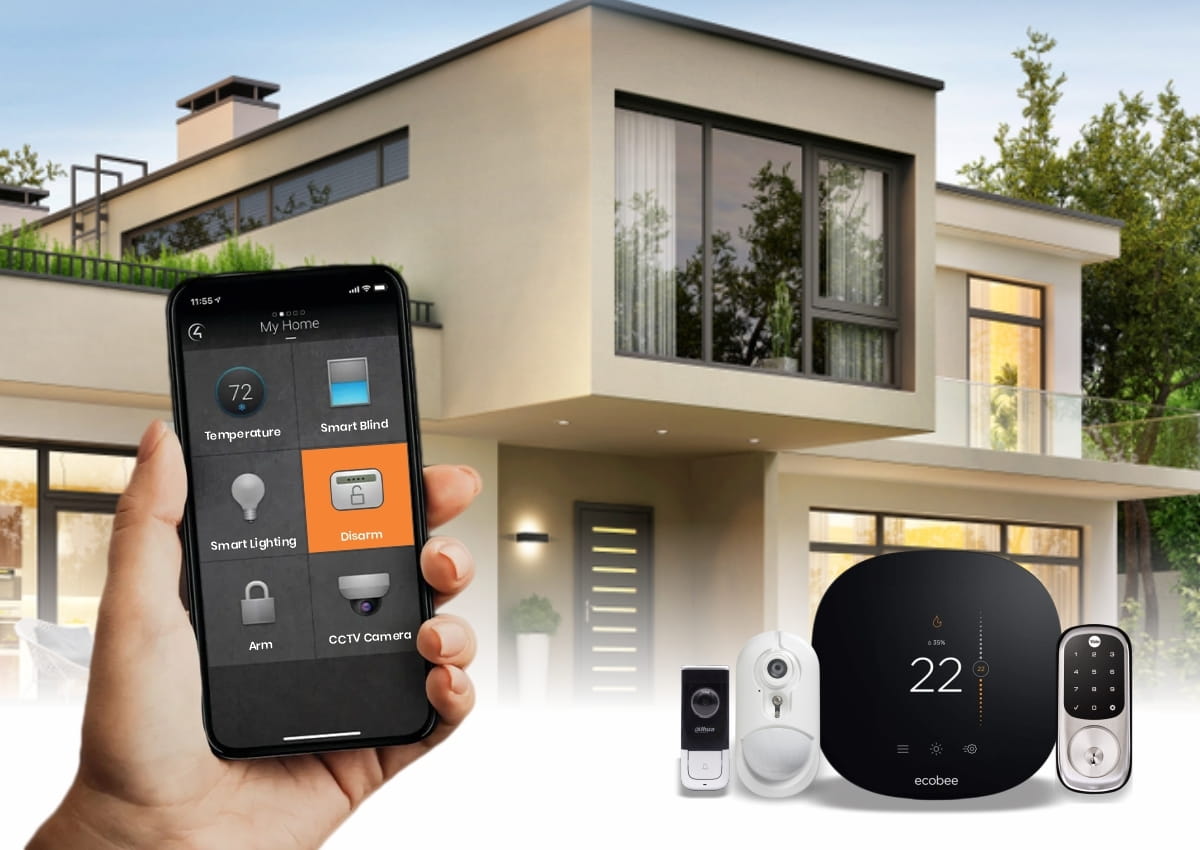Stephen2023-09-28T07:00:29+00:00
Table of Contents
ToggleOne of the most important factors in advancement and productivity are smart homes. In the current race for progress, what makes a smart home more appealing?? Digital dependability and technology consulting is synonymous with comfort and peace of mind.
Safe homes are happy homes. Look after your home from anywhere around the world and keep a check without physically being there. Increase accessibility without compromising on security.
Look after your home while physically not being present there. Keep a check remotely on the door when it’s open or closed. The status of lights and windows, thermostats, and door contacts are available on your phone screens now. This is the level of comfort we talk about.
When we discuss “smart homes,” we are specifically referring to “smart alarm systems,” which help to make life more convenient, easy, and comfortable. NetraClos smart alarm system for home sends notifications about unexpected entrance or unwanted intruder visits & emancipates you from self-monitoring the home appliances & maintenance setup.
Enjoy the relief with NetraClos smart alarm system for home and manage your home remotely.
What is a Smart Alarm System?
The smart alarm system is one of the most coveted aspects of smart homes. This feature is wonderful because it not only looks after your house but also keeps it secure even when you’re not home. You can receive notifications on your phone from this intelligent alarm system for every intruder, doorbell ringing, sewage leak, smoke detector, light on/off, blinds opening, background music, etc.
A remarkable technological breakthrough that has entered people’s lives all across the world is the smart alarm. You can experience a keyless experience with one of the top smart alarm systems for homes. You can use a touchpad to unlock your door lock, and your HD video doorbell let you talk to visitors.
How does a Smart Alarm System Work?
An advanced smart alarm system has the ability to keep an eye on nearby activity. They are able to monitor the environment and provide you with warnings if anything out of the ordinary occurs while you are away. The most effective smart Alarm system in Canada can detect fire or smoke and sound the emergency sirens. When a fire, gas leak, or flood emergency occurs, these smart alarm systems will send you an emergency alert to your phone and inform you.
Common Smart Home Alarm Features
- Motion detector
- Door Contact
- Video Surveillance
- IP CCTV monitoring
- Voice Assistance
- Universal Remote control
- Smartphone Integration
- Self-installation option
- Smart lights sensor
- Temperature sensors
Benefits of Smart Alarm Systems
The key benefits of a smart alarm system are as below:
- Convenience: Convenience is a great feature that comes with smart alarms. It relieves you from self-monitoring and emancipates you from manual checking.
- Functionalities: Smart alarm systems are very functional. They save you time and enable you to access them remotely. Your mobile phone is your control panel of the smart alarm system that gives you access to every device that, includes a thermostat, door handles, smoke detector, smart locks, etc.
- Peace of Mind: When everything around you is controlled and taken care of, it is a great pleasure for people to enjoy peace of mind. You don’t have to worry about what will happen to your place. You have complete access to your home on your phone.
- Smart Integration: Smart alarm systems integrate with all smart assistant devices, so there’s less of a need to pay for monitoring of the alarm, as smart alarms make it possible for the user to monitor their alarm system.
- Accessibility: Smart alarms are accessible remotely. You can check them from any place and turn them on/off at any time.
What are the Challenges?
There are several challenges that alarm systems may face, including:
- False alarms can be a significant problem for alarm systems, as they can lead to unnecessary emergency responses and disrupt the system’s normal functioning. Several factors, such as user error, system malfunctions, or environmental conditions, can cause false alarms.
- System Vulnerabilities: Alarm systems can be vulnerable to hacking or attacks compromising their security and functionality. This can include attacks on the network or the devices and the software or firmware that runs the system.
- Maintenance and Upkeep: Alarm systems require regular maintenance and upkeep to function correctly. The maintainable tasks include battery replacement, software updates, and equipment testing. Failure to maintain the system can lead to malfunctions or false alarms.
- Compatibility Issues: Alarm systems may not be compatible with other systems or devices in a home or business, creating communication issues and reducing the system’s effectiveness.
- Cost: Alarm systems can be expensive to purchase and maintain, which may make them difficult for some individuals or businesses to afford. The price of false alarms and emergency responses can add up over time.
- User Error: Alarm systems require users to follow specific protocols to operate correctly. User errors, such as forgetting to arm the system or entering the wrong code, can lead to false alarms or the system not functioning correctly.
Difference between a Wired and Wireless Smart Alarm Security System
Wired Alarm System
As implied by its name, a wired smart alarm system requires a wire to operate. The monitoring center can receive signals via a landline cable connection. This wireless smart alarm system’s cords are weak points. The weather can harm them.
Wireless Smart Alarm System
A superfluous network of cables is not present in a wireless smart alarm system. Instead, it operates by remotely connecting a number of different sensors to a control panel with built-in radio wave transmitters. When they receive a signal, the numerous sensors set off the alarm.
The ability to control wireless smart alarm systems from a distance is their main benefit. You can turn them on and off with your phone.
Smart Alarm Security System Buying Guide
What are you looking for when you buy a smart alarm security system? This is an important question because you cannot JUST BUY by looking at advertisements. The following features will serve as a smart alarm security system buying guide.
- Costs
Cost is a vital concern when you want to buy a smart home security system. The cost is not “buying cost only”; there are several other expenses: equipment costs, installation costs, activation fees, monitoring costs—as well as any hidden fees.
- Monitoring Options
One key consideration is whether you want to DIY or professional monitoring. Some providers offer both, letting you pick the one that suits your needs.
- Smart Home Integration
Some home security systems offer a feature of integrating with third-party smart home devices like the Nest thermostat, Kwikset smart lock, Apple home kit, Amazon Alexa, Google Assistant, and more.
- Type of Connection
You’ll need a connection to the center if you choose professional monitoring. There are three connection options: landline, broadband, and cellular.
What is a Traditional Alarm?
It was not very long ago that people used to rely on conventional alarm systems. They were doing pretty well, honestly speaking. A traditional alarm is very similar to a smart alarm, but it lacks a few features which the latter has. A traditional alarm is a security system that detects intruders or unauthorized access to a building or property. It typically includes sensors placed on doors, windows, and other entry points, which trigger an alarm if they are opened or tampered with.
Traditional alarms have been a popular form of security for many years and continue to be used by homeowners, businesses, and other organizations worldwide.
Smart vs Traditional Alarm System
A smart alarm system is a modern, connected version of a traditional alarm system that uses advanced technology to provide more functionality and convenience. Here are some key differences between a smart alarm system and a conventional alarm system:
| Features | Smart Alarm Systems | Traditional Alarm Systems |
| Connectivity | Smart alarm systems are connected to the internet and can be controlled remotely using a smartphone app. | Traditional alarm systems are typically standalone systems that can only be controlled locally. |
| Automation | Smart alarm systems can be programmed to perform certain actions automatically, such as turning on lights or adjusting the thermostat when you leave or enter your home. | Traditional alarm systems do not have this capability. |
| Integration | Smart alarm systems can be integrated with other smart home devices, such as cameras, door locks, and smart speakers. This allows for a more comprehensive home. | Traditional alarm systems do not have this level of integration. |
| Customization | Smart alarm systems allow for more customization and flexibility than traditional alarm systems. For example, you can set up different security profiles for different times of the day or customize alerts based on specific triggers. | Traditional alarms are very less likely to be customized as per your need. |
| Cost | Smart alarm systems tend to be more expensive than traditional alarm systems, due to the advanced technology and connectivity features they offer. | The cost of a traditional alarm is comparatively less than a smart one. |
Alarm Alerts
In case of intrusion into your restricted access area, Alarm alerts will start beeping along with your indoor and outdoor lights repeatedly flashing to attract more attention. The TV at your home will also be integrated to watch CCTV security footage to identify where the breach occurred. An emergency alert is also sent to your phone in case you are away so you can take care of it.
NetraClos’ smart alarm system in Canada is highly customizable and available with full-blown setups that include the best security solutions with professional installation.
Smart Keypad
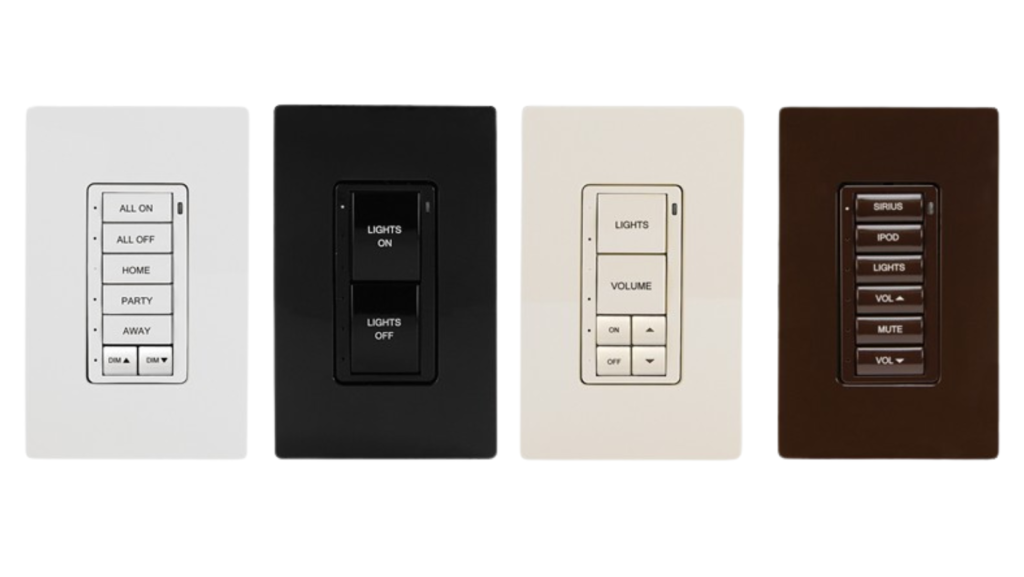
NetraClos home smart alarm system is created with the networking of multiple electronic and electrical devices in your home, which is controlled by a centralized home smart alarm system.
This centralized home smart alarm system can be controlled using a smart touch panel, a universal remote control, your smartphone, or with a tablet. It is also possible to control and monitor through and above all.
The reason we say it’s the best smart alarm system for the home is, you can automate and schedule your tasks at your convenience such as:
- Turn the temperature up after 5 pm.
- Maintain a uniform temperature of your place and monitor it remotely.
- Open the automated motorized blinds and specific lights at 7 am.
- Start playing your favorite music at 7:30 to help wake you up.
- Disarm the alarm when you get home.
- Replicate your daily routines even when you’re away from home for a long. Such as turning on lights in the evening, turning on the television, and playing music during specific hours.
Home automation can be installed in new homes as well as in existing homes with the help of wireless technology and best of all; it’s now more affordable than ever.
Reliable & Trusted Security
NetraClos helps you to “be at home when you are not” through its mock lights feature. To warn you of issues (like a thermostat failure or sewage leakage) that could damage your home, NetraClos security sensors can keep an eye on the home essentials in your absence. The home is integrated with automated lights, so you can turn them ON/OFF remotely even when you are not around. This leaves an impression on you at home even when you’re not around. You can make updates via your phone as well.
Check-In Remotely from Anywhere in the World
Your location does not take your attention away from taking care of your house/office. Whether you are away for an hour or a month, we assist you in planning your trips without worrying about who will take care of your home. You can monitor everything with just a tap of your finger. The ultimate liberty that comes from installing NetraClos Smart Alarm Security System unslaved you.
NetraClos Home Automation
Security is not just one feature that NetraClos offers. Protection, comfort, & peace of mind that comes with user-friendly & swift services are irreplaceable. Integrating the NetraClos security system with the rest of your home makes your home genuinely responsive & protected. Learn more about what NetraClos offers & what our Home Automation Solutions can do for you. Visit NetraClos
Our Top Tested Products
| Product Title | Model Number | Specifications |
| Yale Assure Touchscreen Deadbolt with Key | yrd226-CBA-BSP | Wi-Fi/Z-Wave Kit |
| Ecobee EB-STATE3LTPC-02 3 Lite Pro Smart Thermostat | EB-STATE3LTPC-02 | ENERGY STAR® certified |
| Google Nest Thermostat E (T4000EF) | T4000EF | Meet the Heat Link E. |
| Honeywell Home TH6220WF2006/U T6 Pro Smart Thermostat, 2H/2C | TH6220WF2006/U | Up to 2H/1C heat pump and 2H/2C conventional |
| 1080p HD Outdoor Wi-Fi Smart Doorbell | DS-HD2 | Advanced motion detection with a customizable detection area |
Yale Assure YRD226-CBA-BSP Touchscreen Deadbolt with Key, Black Suede
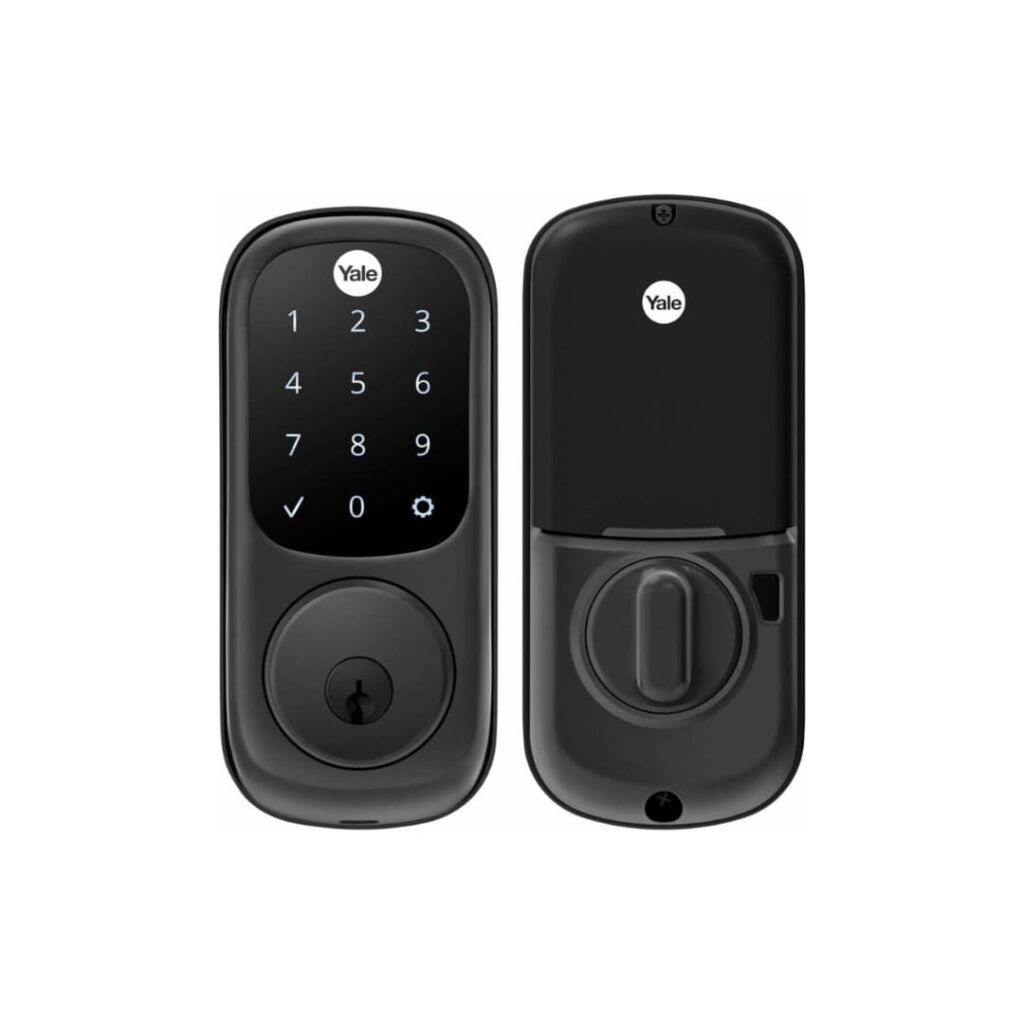
Features:
- Easy to install and easily replaces current deadbolt
- NetraClos home smart alarm system app allows for locking/unlocking, access sharing, and status notifications.
- Use a key, the built-in keypad, digital key.
- Long-lasting battery
- Wi-Fi and Bluetooth compatible
- No additional hub is required.
- Geofencing capable
- Tamper Resistant Battery Cover
- Weather Protection Gasket
- OneTouch locking
- Smooth touchscreen keypad with backlit numbers that won’t wear off
- Stores up to 250 codes with a Smart Module (25 without)
- Privacy Button
- Limited manufacturer’s warranty
Ecobee EB-STATE3LTPC-02 3 Lite Pro Smart Thermostat
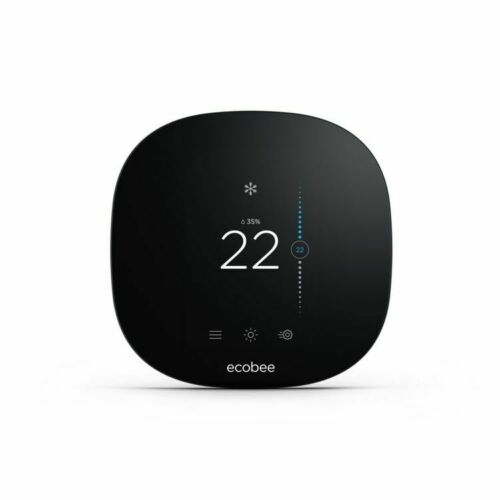
Designed for Smarter Savings and Control. It has the necessary elements to begin helping you save up to 23% yearly on heating and cooling. For improved comfort in the rooms that matter most.
Features:
- ENERGY STAR® certified
- Save you nearly 23% of energy costs annually.
- Control from anywhere on iOS and Android
- Apple HomeKit + more integrations
- Compatible with Smart Sensor
- Works seamlessly with Apple HomeKit on all iOS devices, including Apple Watch, and leading smart home ecosystems, including the Google Assistant.
Google Nest Thermostat E (T4000EF)
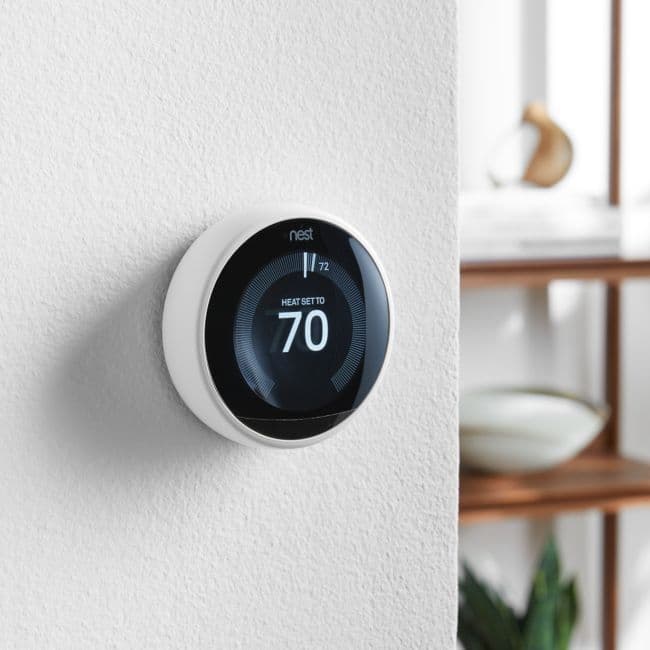
Features:
- It’s easy to save energy.
- Meet the Nest Thermostat E.
- Turn it up or down from anywhere.
- You can change the temperature with a mobile app from your phone, your laptop, or any tablet in use. Or you can just voice commands with your home assistant.
- It’s energy efficient.
- The Nest Thermostat E is integrated with your home schedule to help you save energy from day one. It remembers when everyone leaves the home, so it turns itself off and saves energy. The self-reliance also helps you to cut your budget and when you change to an energy-saving temperature, you’ll see the Nest Leaf.
- Meet the Heat Link E.
- The Heat Link E is integrated into your heating system and works collaboratively with the Nest Thermostat E to turn on and off or regulate the temperature. It can also sense the temperature in the room.
- It blends in beautifully.
- The frosted display shows you the temperature when you’re up close, then it all disappears when you walk away. And you can place the Nest Thermostat E on a table or desk in a room that matters most.
- It’s easy to install yourself.
- You don’t need to access your heating system. The Heat Link E goes in the same spot as your current wired thermostat. And you can put the Nest Thermostat E anywhere you like.
Honeywell Home TH6220WF2006/U T6 Pro Smart Thermostat, 2H/2C
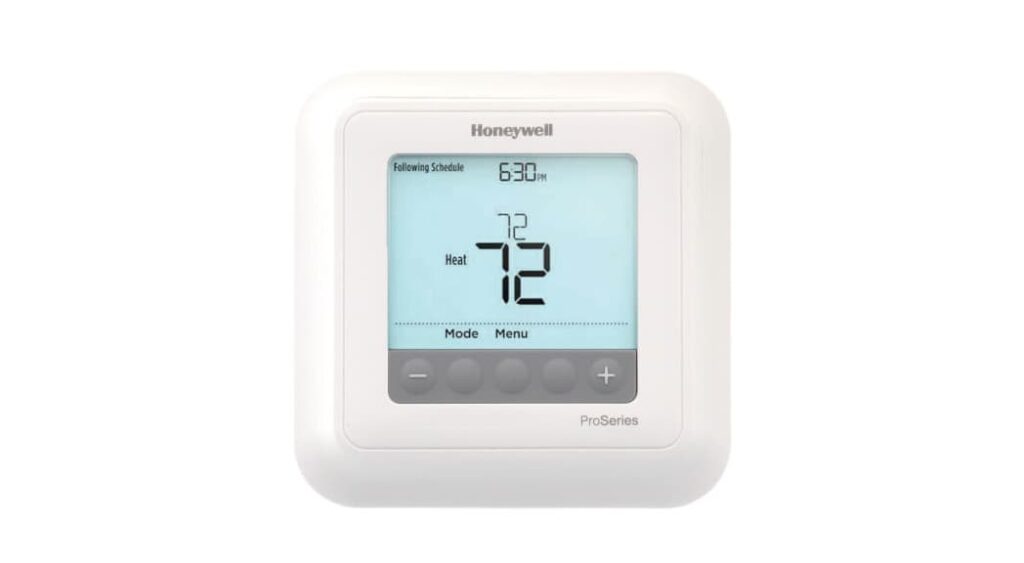
Set it up according to the homeowners’ timetable or leave it to change as your schedules
evolve. Using a smartphone or tablet you can make adjustments from anywhere,
assuring maximum comfort when inside and energy efficiency whether they are home or
not.
Features:
• Up to 2H/1C heat pump and 2H/2C conventional Geofencing, 7days a week, 5-2, 5-1-1,
1-week or if needed non-programmable
• Utilizes the UWP mounting system which is standard across every T-Series thermostat
• Wall mountable
• Integrates with smart home Apple HomeKit and Amazon Alexa if you want to control
your thermostat devices from a single app
• You can also program a schedule or use location-based control with geofence
technology, which uses your smartphone location to save energy when away and make
the home comfortable when you return back home
• Optional wired indoor/outdoor sensors
• Large touchscreen display
• 5-year warranty
• ENERGY STAR® certified
1080p HD Outdoor Wi-Fi Smart Doorbell

Hikvision’s DS-HD2 Smart Doorbell is a standard doorbell of your choice.
Features:
- Advanced motion detection with a customizable detection area,
- Long-range infrared night-vision up to 19.7ft
- Dual-band Wi-Fi connectivity
- Ability to access live view
- Talk to visitors with two-way audio via a mobile application
- Gives users a high level of convenience needed in managing front door activities.
FAQs
Both wired and wireless alarm systems have advantages and disadvantages, and which one is better depends on the user’s specific needs. Here are some points to consider:
Wireless Alarm Systems
Advantages
Easy Installation: Wireless systems do not require drilling or wiring, making installation easier and faster.
Flexible: Wireless systems can be easily moved and expanded, making them a good option for renters or those who plan to move.
Remote Access: Wireless systems can be controlled remotely through a smartphone app or computer, making it easy to arm and disarm the system from anywhere.
Disadvantages
Signal Interference: Wireless signals can be interfered with by other wireless devices or even physical obstacles like walls, which can cause false alarms or reduce the system’s effectiveness.
Battery Life: Wireless devices require batteries, which must be replaced periodically.
Reliance on the Network: Wireless systems rely on a network connection, which can disrupt power outages or network issues.
Wired Alarm Systems
Advantages
Reliable: Wired systems are generally more reliable than wireless systems, as they are not subject to signal interference or network disruptions.
Longer Lifespan: Wired systems have a longer lifespan than wireless systems, as they do not rely on batteries that need to be replaced periodically.
Lower Cost: Wired systems can be less expensive than wireless systems, especially if the building already has pre-installed wiring.
Disadvantages
Complicated Installation: Wired systems require drilling and running wires through walls, which can be time-consuming and expensive.
Less Flexible: Once installed, wired systems can be easily moved or expanded with significant work and expense.
Limited Remote Access: Wired systems may have a different remote access and control level than wireless systems.
Ultimately, deciding between a wired or wireless alarm system depends on individual preferences and needs. If reliability, longevity, and cost are the main concerns, a wired approach may be better. A wireless system may be the better choice if ease of installation, flexibility, and remote access are essential.
- Budget
- Monitored Or Unmonitored
- Level Of Security Services
- Compatibility With Smart Devices
- Internet And Bluetooth Connection
- Voice Assistance i-e Alexa, Google Assistant, Apple Homekit
In conclusion, you must question yourself: Can you install a system on your own, or do you require expert assistance?
And once you know the answers to all of these, you may call us right away for ideas on how to make your house secure. Dial us at +647-725-9693 or visit www.netraclos.com
There are many different manufacturers of smart alarm systems, which gives you a large selection from which to pick. Despite the fact that many of them share features, each type of security equipment has its own benefits and drawbacks.
One of the challenges smart alarm systems pose to consumers is the risk of being hacked. Although the risk is shallow, we recommend you be vigilant. Improper home network configurations, device flaws, or easy-to-hack passwords are the leading causes of hacking.
Yes, wireless alarm systems can be hacked, to be very honest.
But that does not imply that it is a done deal. Every wireless device or system has the potential to be hacked. Any internet-connected device can be compromised, however, the likelihood of a security system being hacked is very low.
With effective measures, hacking can be avoided.
Well, the cost varies as per your requirement and needs. A wired smart alarm system would typically run you between $750 and $2,000, excluding installation whereas A wireless alarm system typically costs between $250 and $1,200 excluding installation.
We recommend a noninvasive home security system if you live in a rental property. On a rental property, you will only be challenged when you need to drill into walls or doors or rewire a doorbell. You can still install a home security system if you do not own a house.
Totally. You won’t regret the choice once you install a smart alarm system in your home. For a contemporary home, a smart alarm system is a tried, true and efficient solution. You are always relieved of needless stress and manual management thanks to it. A smart alarm system is presently a wise investment that is worth your money.
1. Installation of the Alarm System Panel
The alarm system panel consists of small size. You can place it in your lounge on the wall or in the living room. The alarm system panel can either be stuck to the wall using adhesive tape or hung using hanging clips or nails.
2. Install Sensors
An alarm system consists of multiple sensors, e.g. door handles, thermostats, smoke detectors, window alarms, motion sensors, etc. Place the sensors in the proper place. Usually, the sensors are stuck to the wall using adhesive peel and stick tapes. A guideline comes with every detector. Please read it carefully before placing sensors.
3. Test the Security System
Follow the smart alarm manual guidelines to test the system and ensure everything works correctly.
The smart alarm system does not rely on wifi for its operations. It still works without wifi and does not disrupt the functionality.
Yes. Your smart alarm can be easily integrated into your phone. Every smart alarm system comes with its app. If your home has any voice assistant, i.e. Alexa, apple home kit, or Google voice assistant, you can easily integrate your smart alarm.
Otherwise, the August app helps you to get connected to your phone.
Alarm systems have backup batteries to operate, so power failure does not affect the efficiency of the alarm system.
Police do not respond to burglar alarms unless they get a confirmation of criminal activity or a threat to personal safety.
Yes, many alarm companies require customers to sign contracts. These contracts typically outline the terms and conditions of the service you take from companies.
The contract usually includes,
- The length of the service agreement.
- The types of services provided.
- Fees associated with those services.
The contract may also include,
- Information on cancellation fees.
- Equipment warranties.
- Other essential details.
It’s important to carefully read and understand the terms of any agreement before signing and to ask questions if anything needs to be clarified.

